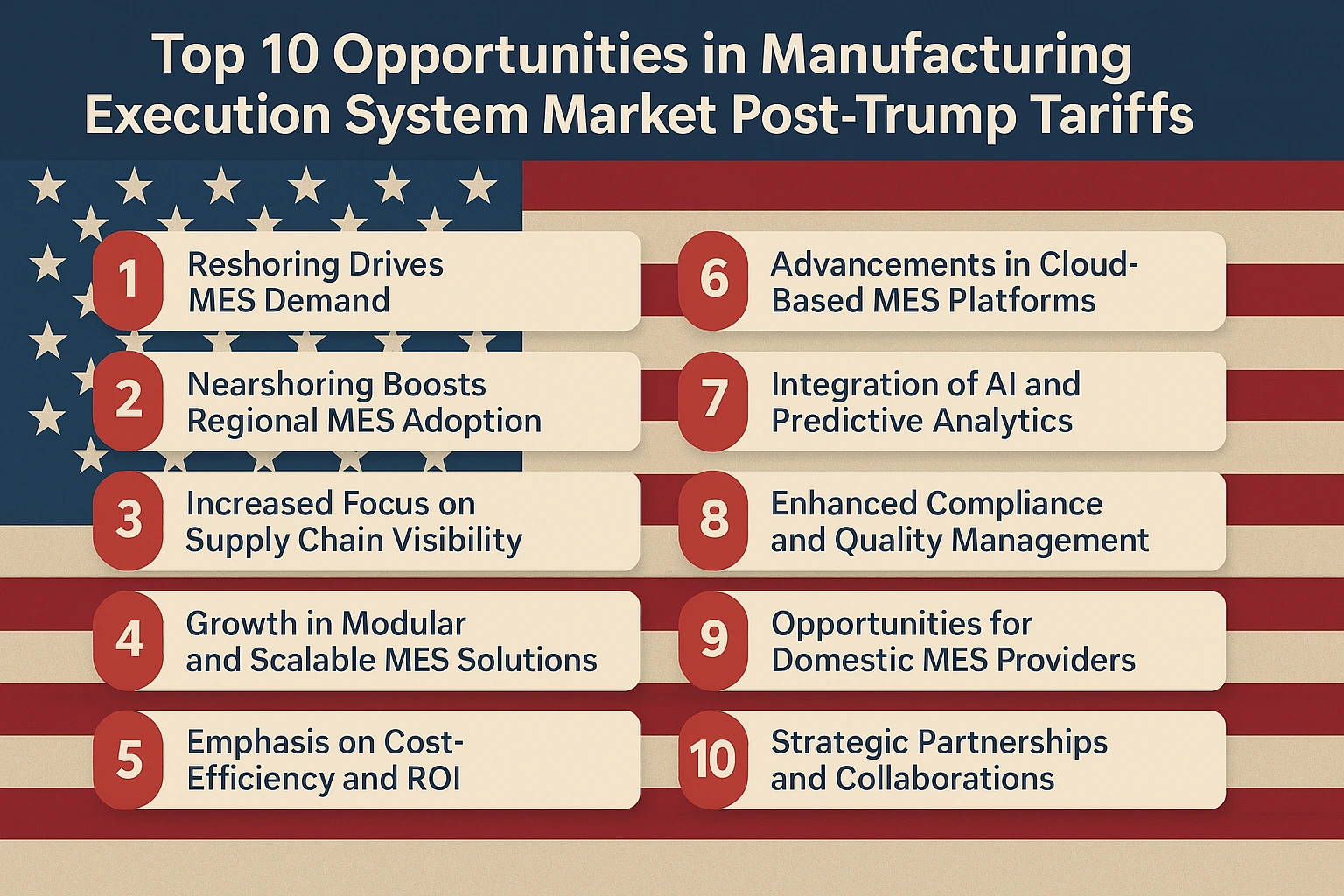Top 10 Opportunities in Manufacturing Execution System Market Post-Trump Tariffs
The post-Trump tariff era has introduced a complex landscape for the Manufacturing Execution System (MES) market.While challenges such as increased costs and supply chain disruptions persist, these shifts also unveil a spectrum of opportunities for MES providers and manufacturers aiming to enhance operational efficiency and resilience.
Reshoring Drives MES Demand
The imposition of tariffs has incentivized many U.S. manufacturers to relocate production domestically.This reshoring trend necessitates advanced MES solutions to manage and optimize new or expanded facilities, ensuring streamlined operations and compliance with domestic standards.
Request Trump Tariff Threat Assessment Analysis Now:
https://www.marketsandmarkets.com/forms/ctaTariffImpact.asp?id=536

>
Nearshoring Boosts Regional MES Adoption
Countries like Mexico have gained a competitive edge due to favorable trade agreements like the USMCA, making them attractive nearshoring destinations.Manufacturers moving operations closer to the U.S. are investing in MES platforms to maintain quality and efficiency across borders.
Increased Focus on Supply Chain Visibility
Tariff-induced uncertainties have highlighted the need for real-time supply chain insights.MES solutions offering enhanced traceability and transparency are in demand, enabling manufacturers to respond swiftly to disruptions and maintain continuity.
Growth in Modular and Scalable MES Solutions
To mitigate financial risks associated with tariffs, manufacturers are seeking modular MES systems that allow incremental implementation.This approach provides flexibility and scalability, accommodating evolving operational needs without substantial upfront investments.
Emphasis on Cost-Efficiency and ROI
With increased operational costs, there's a heightened emphasis on MES solutions that deliver quick returns on investment.Features that enhance productivity, reduce waste, and optimize resource utilization are particularly valued.
Advancements in Cloud-Based MES Platforms
The shift towards remote operations and the need for scalable solutions have accelerated the adoption of cloud-based MES platforms.These systems offer cost-effective deployment, ease of access, and seamless updates, aligning with the dynamic needs of modern manufacturing.
Integration of AI and Predictive Analytics
Manufacturers are leveraging AI-driven MES solutions to anticipate and mitigate the impacts of tariffs and other market fluctuations.Predictive analytics facilitate proactive decision-making, enhancing agility and competitiveness.
Enhanced Compliance and Quality Management
Tariffs have underscored the importance of adhering to diverse regulatory standards.MES platforms that ensure compliance and uphold quality across different markets are essential for manufacturers operating globally.
Opportunities for Domestic MES Providers
The focus on domestic production has opened avenues for U.S.-based MES providers to cater to local manufacturers.Tailored solutions that address specific regulatory and operational requirements are gaining traction.
Strategic Partnerships and Collaborations
To navigate the complexities introduced by tariffs, MES providers are forming strategic partnerships with technology firms, consultants, and industry stakeholders.These collaborations aim to deliver comprehensive solutions that address the multifaceted challenges faced by manufacturers.
In summary, while the post-Trump tariff landscape presents challenges, it also offers a fertile ground for innovation and growth in the MES market.By focusing on adaptability, efficiency, and strategic alignment, MES providers can play a pivotal role in shaping the future of manufacturing.
80% of the Forbes Global 2000 B2B companies rely on MarketsandMarkets to identify growth opportunities in emerging technologies and use cases that will have a positive revenue impact.
- Food Packaging Market Size Set for Strong Growth Through 2030 Amid Rising Demand for Convenience Foods
- Fertilizers Industry Set to Grow at 4.1% CAGR Through 2030
- Leading Automated Guided Vehicle Companies 2024: An In-depth Analysis
- CHARGED UP: SHIFT TO E-MOBILITY AND THE EVOLUTION OF TRANSPORTATION
- Global Automotive Market: Predictions For 2024


